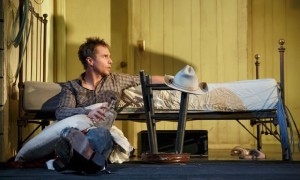Lassoing the Bedposts in FOOL FOR LOVE
You watch the stuntman Eddie in his cowboy duds lassoing the bedposts in the motel room on the edge of the Mojave Desert. And you can go big picture or little picture. Big picture is Eddie’s indoor rodeo for his half-sister May is symbolic of the closing of the Great American West, a cowboy trapped in the Cracker Jacks box of modern life . . . Little picture, you agree with May: he’s just showing off, the way a boy tries to impress a girl. He’s a fool for love.
After all it’s “Eddie.” Not Ed or Edward.
Sam Rockwell brings a menacing yet boyish charm to the role in the current Broadway production of FOOL FOR LOVE. He told the New York Times that to prepare for the role he went to rodeos, hung out with wranglers, and studied roping. He practiced by lassoing trashcans in Tompkins Square Park. To steady his throws, he does a half hour of throws before the curtain goes up. About what drives his character, Rockwell said:
“Ultimately, the scene is not about roping; the scene is about two cosmically entwined lovers. The character is incredibly vulnerable. He brings a shotgun, a bottle of tequila—all this macho swagger, to cover up that fact that he’s afraid of being abandoned. And that’s what the play is about.”
As the play moves forward, the cowboy routine seems more and more the role-playing of a little kid. Eddie tells May he’s practicing. But more than practicing, it’s avoidance: the arrested development by a man traumatized by the sad end of his mother.
It’s the reverse of a child feigning at a glorious Tom Mix adulthood. It’s the traumatized adult pretending to be that child again. Eddie is so terrified of becoming his father, the source of the family tragedy, that he can’t put away the cowboy fantasy.
His Face and Her Neck
Early in FOOL FOR LOVE, Eddie tells May he’s driven 2,480 miles to come see her and an odd–even for them–exchange follows. The stage directions instruct that Eddie is looking down as he speaks and sticking close to the wall.
EDDIE: I missed you. I did. I missed you more than anything I ever missed in my whole life. I kept thinkin’ about you the whole time I was driving. Kept seeing you. Sometimes just a part of you.
MAY: Which part?
EDDIE: Your neck.
MAY: My neck.
EDDIE: I missed all of you but your neck kept coming up for some reason. I kept crying about your neck.
MAY: Crying?
EDDIE: Yeah. Weeping. Like a little baby. Uncontrollable. It would just start up and stop and then start up all over again. For miles. I couldn’t stop it. Cars would pass me on the road. People would stare at me. My face was all twisted up. I couldn’t stop my face.
Here Eddie admits to missing May in a primal way, like a balling infant picked up and held, his face to his mother’s neck. A grown-up cowboy wouldn’t lose control of his face from missing a woman, or, at least, wouldn’t admit to it. This is the charm of Eddie, his crying game, the kid half-brother showing his vulnerability. This is Eddie’s all-out need for her as he tries to win May over one more time.


Recent Comments